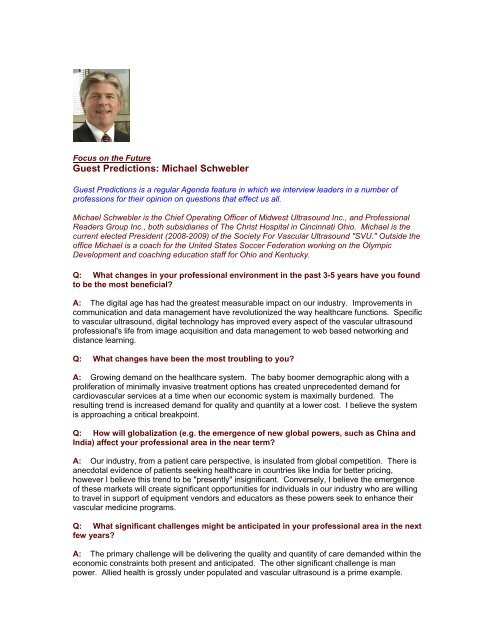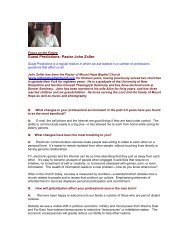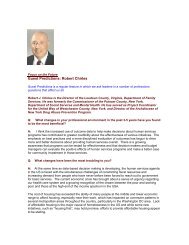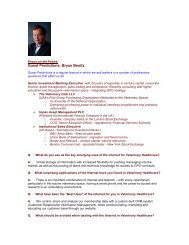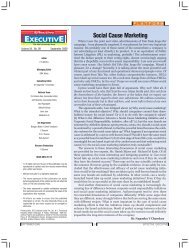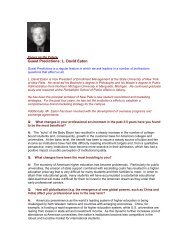Guest Predictions: Michael Schwebler - The Regis Group Inc
Guest Predictions: Michael Schwebler - The Regis Group Inc
Guest Predictions: Michael Schwebler - The Regis Group Inc
- No tags were found...
You also want an ePaper? Increase the reach of your titles
YUMPU automatically turns print PDFs into web optimized ePapers that Google loves.
Focus on the Future<strong>Guest</strong> <strong>Predictions</strong>: <strong>Michael</strong> <strong>Schwebler</strong><strong>Guest</strong> <strong>Predictions</strong> is a regular Agenda feature in which we interview leaders in a number ofprofessions for their opinion on questions that effect us all.<strong>Michael</strong> <strong>Schwebler</strong> is the Chief Operating Officer of Midwest Ultrasound <strong>Inc</strong>., and ProfessionalReaders <strong>Group</strong> <strong>Inc</strong>., both subsidiaries of <strong>The</strong> Christ Hospital in Cincinnati Ohio. <strong>Michael</strong> is thecurrent elected President (2008-2009) of the Society For Vascular Ultrasound "SVU." Outside theoffice <strong>Michael</strong> is a coach for the United States Soccer Federation working on the OlympicDevelopment and coaching education staff for Ohio and Kentucky.Q: What changes in your professional environment in the past 3-5 years have you foundto be the most beneficial?A: <strong>The</strong> digital age has had the greatest measurable impact on our industry. Improvements incommunication and data management have revolutionized the way healthcare functions. Specificto vascular ultrasound, digital technology has improved every aspect of the vascular ultrasoundprofessional's life from image acquisition and data management to web based networking anddistance learning.Q: What changes have been the most troubling to you?A: Growing demand on the healthcare system. <strong>The</strong> baby boomer demographic along with aproliferation of minimally invasive treatment options has created unprecedented demand forcardiovascular services at a time when our economic system is maximally burdened. <strong>The</strong>resulting trend is increased demand for quality and quantity at a lower cost. I believe the systemis approaching a critical breakpoint.Q: How will globalization (e.g. the emergence of new global powers, such as China andIndia) affect your professional area in the near term?A: Our industry, from a patient care perspective, is insulated from global competition. <strong>The</strong>re isanecdotal evidence of patients seeking healthcare in countries like India for better pricing,however I believe this trend to be "presently" insignificant. Conversely, I believe the emergenceof these markets will create significant opportunities for individuals in our industry who are willingto travel in support of equipment vendors and educators as these powers seek to enhance theirvascular medicine programs.Q: What significant challenges might be anticipated in your professional area in the nextfew years?A: <strong>The</strong> primary challenge will be delivering the quality and quantity of care demanded within theeconomic constraints both present and anticipated. <strong>The</strong> other significant challenge is manpower. Allied health is grossly under populated and vascular ultrasound is a prime example.
<strong>The</strong>re is a clear need for well organized and funded grass roots efforts designed to attractyounger talent to the field.Q: What are the greatest challenges confronting young professionals in Western culturetoday?A: In allied health and the vascular ultrasound profession in particular, technology andeconomics present the greatest challenges. Technological advances are occurring at such arapid rate that professionals can scarcely stay current. Ironically, these same technologychanges along with economic pressure may put the need for highly skilled labor at risk asWashington looks to reform our healthcare system.


